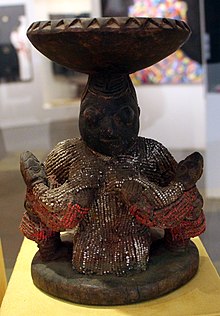Major water Orisha from the Yoruba religion From Wikipedia, the free encyclopedia
Yemọja (also: Yemaja, Yemanjá, Yemoyá, Yemayá; there are many different transliterations in other languages) is the major water spirit from the Yoruba religion.[1] She is the mother of all Orishas. She is also the mother of humanity. She is an orisha, in this case patron spirit of rivers, particularly the Ogun River in Nigeria, and oceans in Cuban and Brazilian orisa religions. She is often syncretized with either Our Lady of Regla in the Afro-Cuban diaspora or various other Virgin Mary figures of the Catholic Church, a practice that emerged during the era of the Trans-Atlantic slave trade. Yemọja is said to be motherly and strongly protective, and to care deeply for all her children, comforting them and cleansing them of sorrow. She is said to be able to cure infertility in women, and cowrie shells represent her wealth. She does not easily lose her temper, but when angered she can be quite destructive and violent, as the flood waters of turbulent rivers. Some of the priests of Yemọja believe that she used her fresh water to help Ọbàtálá in the molding of human beings out of clay.
This article needs additional citations for verification. (June 2024) |
| Yemọja | |
|---|---|
Goddess of Creation, Water, Moon, the Motherhood, and Protection | |
| Member of Orisha | |
 Yemọja with Ibeji | |
| Other names | Yemaya • Yemaja • Iemanja |
| Venerated in | Yoruba religion • Umbanda • Candomblé • Santeria • Haitian Vodou • Dominican Vudú |
| Symbols | water • the moon • cowrie shells |
| Day | 2 February 31 December 8 December 7 September |
| Color | Blue and White/Crystal beads |
| Number | Seven |
| Region | Yorubaland • Brazil • Cuba |
| Ethnic group | Yoruba people |
| Equivalents | |
| Greek | Selene |
| Roman | Luna • Ceres |
| Bakongo | Nzambici |
| Igbo | Ala |
| Catholic | Virgin Mary • (Our Lady of Navigators) |
Yemọja is often depicted as a mermaid by a number of devotees, and is associated with water, feminine mysteries, and the moon in some diaspora communities. She is the protector of women. She governs everything pertaining to women; parenting, child safety, love, and healing. According to myth, when her waters broke, it caused a great flood creating rivers and streams and the first mortal humans were created from her womb.

In traditional Yoruba culture and spirituality, Yemọja is a mother spirit; patron spirit of women, especially pregnant women; She is the patron deity of the Ogun river (Odò Ògùn) but she has other rivers that are dedicated to her throughout Yorùbáland. In addition, she is also worshipped at almost any stream, creek, springs in addition to wells and run-offs.
Her name is a contraction of the Yoruba words Iye, a dialect variant of "ìyá" meaning "mother"; ọmọ, meaning "child"; and ẹja, meaning "fish"; roughly translated the term means "mother of fish children". This represents the vastness of her motherhood, her fecundity, and her reign over all living things.
The river deity Yemoja is often portrayed as a mermaid, even in West Africa, and she can visit all other bodies of water, but her home and the realm she owns are rivers and streams, especially the Ogun River in Nigeria.
River deities in Yorubaland include Yemo̩ja, Ọ̀ṣun (Oshun), Erinlè̩, Ọbà, Yewa, etc. It is Olókun that fills the role of sea deity in Yorubaland, while Yemoja is a leader of the other river deities.
In West Africa, Yemoja is worshipped as a high-ranking river deity, but in Brazil and Cuba she is worshipped mainly as a sea/ocean deity.
In Candomblé and Umbanda, Yemanjá is one of the seven Orixás. White roses are used as a ritual offering.[2] She is the Queen of the Ocean, the patron spirit of the fishermen and the survivors of shipwrecks, the feminine principle of creation, and the spirit of moonlight. Saturday is the consecrated day of Yemanjá.[4]
In Brazil, Yemanjá is syncretized with Our Lady of Navigators (Nossa Senhora dos Navegantes) and Our Lady of the Conception (Nossa Senhora da Conceição).[4]
Sacred objects associated with Yemanjá that are placed in the pegi, the room or space dedicated to an orixá, include:
Guinea fowl, ducks, hens, she-goat are sacrificed ("orô") on festival days associated with Yemanjá in the Candomblé tradition. Animals sacrificed to Yemonja must be thrown in the water for their disposal.[4]

In Santería or regla de ocha, Yemayá is the mother of all living things as well as the owner of the oceans and seas.[10]

When ducks, roosters and rams as four-legged animals.
In Montevideo, worshippers gather on Ramírez Beach in the Parque Rodó neighborhood every February 2 to celebrate Iemanjá Day.[14] Hundreds of thousands sit waiting for the sunset before they launch small boats with offerings into the ocean.
In 2015, the Uruguayan government estimated that 100,000 people[15] had visited the beach for the celebrations.
Seamless Wikipedia browsing. On steroids.